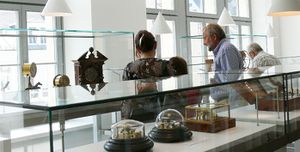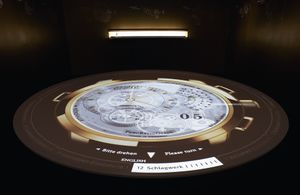German Watch Museum Glashütte/en: Unterschied zwischen den Versionen
Keine Bearbeitungszusammenfassung |
Keine Bearbeitungszusammenfassung |
||
| Zeile 10: | Zeile 10: | ||
Thematically, the exhibition is divided into historical rooms and time rooms. | Thematically, the exhibition is divided into historical rooms and time rooms. | ||
[[Bild:Uhrenmuseum Raum Uhrmacherschule.jpg|thumb|left|„historical room“ Watchmaking | [[Bild:Uhrenmuseum Raum Uhrmacherschule.jpg|thumb|left|„historical room“ School of Watchmaking]] | ||
The historical rooms convey the chronological background of the watch town and present, at the beginning, the celebrities and the founding fathers, thanks to whom Glashütte became an important centre of fine German watchmaking and watchmaker training. Throughout the exhibition, there are other major stages, such as the founding years, the First and Second World Wars, the time of disintegration and expropriation just like the German reunification and the new beginnings. | The historical rooms convey the chronological background of the watch town and present, at the beginning, the celebrities and the founding fathers, thanks to whom Glashütte became an important centre of fine German watchmaking and watchmaker training. Throughout the exhibition, there are other major stages, such as the founding years, the First and Second World Wars, the time of disintegration and expropriation just like the German reunification and the new beginnings. | ||
[[Bild:Uhrenmuseum Glashütte Projektion Uhrwerk.jpg|thumb|time room]] | [[Bild:Uhrenmuseum Glashütte Projektion Uhrwerk.jpg|thumb|time room]] | ||
Version vom 30. Januar 2009, 00:19 Uhr
German Watch Museum Glashütte
| other languages: de |

Watch Museum with an international reputation
On 22 May 2008, the new "German Watch Museum Glashütte" opened its doors in the former School of Watchmaking Glashütte.
There are more than 400 unique exhibits on two floors with an exhibition space of 1000 m². With the help of multimedia, one can learn about Glashütte pocket watches, pendulum clocks and wristwatches, historical certificates and patents, escapement modelstools and marine chronometers, workbenches and astronomical models and many more.
Thematically, the exhibition is divided into historical rooms and time rooms.

The historical rooms convey the chronological background of the watch town and present, at the beginning, the celebrities and the founding fathers, thanks to whom Glashütte became an important centre of fine German watchmaking and watchmaker training. Throughout the exhibition, there are other major stages, such as the founding years, the First and Second World Wars, the time of disintegration and expropriation just like the German reunification and the new beginnings.

The time rooms do not fit in the chronological progression of the Glashütte watch history and get the visitors into the world of different kinds of clocks. In such a way the visitors can learn the precision and the interaction of hundreds of details. They can find out something interesting on their own in the multimedia time room with an interactive glossary of chronometry.
This "time world" is designed not only for watch connoisseurs but also to nonexperts, families and young people in order to transmit to the youth the admiration of the art of watchmaking and the knowledge of timekeeping.
Abbildungen
-
Präzisionspendeluhr Strasser und Rohde
-
Multimedialer „Zeitraum“ Glossar
-
Entwicklungsstufen der Taschenuhren
-
Im Takt der Metronome
-
Neuzeit: Die Renaissance der mechanischen Uhr
-
Taschenuhr in Motion
-
Russische Offiziere überwachen in Glashütte den Abtransport demontierter Maschinen
Address
Deutsches Uhrenmuseum Glashütte
Schillerstraße 3 A (This place indicate)
01768 Glashütte
Tel. 03 50 53/4 62 81
Fax: 03 50 53/4 62 05
Opening times
Open daily from 10-17h






